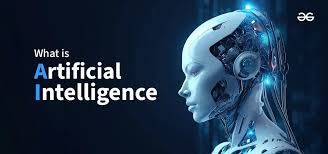CALL US NOW!
AI: What is it????
Daina Williams • March 31, 2025
The AI Enigma: Fear, Jobs, and the Future – A Deeper Dive 🤖

Artificial intelligence. It's a phrase that conjures images of sleek robots, complex algorithms, and a future both thrilling and unsettling. We're witnessing an unprecedented technological revolution, with AI at its core. But as we embrace these advancements, a crucial question lingers: are we creating a utopia or a dystopia? Let's delve deeper into the complexities of AI, exploring its potential impact on jobs, ethics, and the very fabric of our society.
The Shadow of Fear: Understanding the Anxiety
The apprehension surrounding AI isn't unfounded. It's rooted in a combination of factors:
- The Unknown: AI's rapid evolution often outpaces our understanding, leading to a sense of uncertainty.
- Sci-Fi Dystopia: Popular culture frequently portrays AI as a menacing entity, fueling anxieties about a robot-dominated future.
- Existential Concerns: The prospect of machines surpassing human intelligence raises profound questions about our place in the world.
- Job Security: The fear of automation displacing human workers is a significant source of anxiety.
The Job Market: A Shifting Landscape, Not a Catastrophe
The impact of AI on employment is a nuanced issue, far removed from the simplistic narrative of "robots stealing jobs." While certain roles are indeed vulnerable, AI is also a catalyst for new opportunities and the evolution of existing ones.
Vulnerable Roles:
- Repetitive data processing and administrative tasks.
- Basic customer service and telemarketing.
- Assembly line work and some transportation roles.
Emerging Opportunities:
- AI development, programming, and engineering.
- Data science, machine learning, and AI training.
- AI ethics, compliance, and regulatory roles.
- AI-driven marketing, sales, and business strategy.
The key takeaway is that AI will necessitate a workforce that is adaptable and equipped with new skills.
AI Certifications: Your Competitive Edge
In a market increasingly driven by AI, certifications are invaluable assets. They validate expertise in critical areas, such as:
- Machine learning and deep learning.
- Natural language processing and computer vision.
- Data analysis and AI programming.
- Cloud-based AI platforms.
These certifications can significantly enhance career prospects in fields like software development, data science, and AI research.
The Resilience of Blue-Collar Jobs: Human Skill and Dexterity
While AI is transforming many industries, certain professions remain relatively "AI-proof," particularly those requiring manual dexterity, problem-solving in unpredictable environments, and real world physical manipulation. This is where blue-collar workers shine.
- Plumbers, Electricians, and Handymen: These skilled trades require a high degree of adaptability, problem-solving, and physical dexterity. AI-powered robots may be able to perform some tasks, but they lack the ability to handle the unpredictable situations and complex repairs that these professionals encounter daily. A robot cannot easily unjam a pipe that is in a very hard to reach location.
- Construction Workers: Building and construction involve complex tasks that require human judgment and coordination. AI-powered machinery may assist with certain tasks, but it cannot replace the human element in complex construction projects.
- Mechanics: Repairing and maintaining vehicles and machinery requires a combination of technical knowledge and hands-on skills. AI may assist with diagnostics, but it cannot replace the human mechanic's ability to troubleshoot and repair complex mechanical problems.
- Landscaping: This profession requires the ability to judge the land, and make decisions based on the environment. AI is not able to adapt to the ever changing outdoor environment like a human can.
These professions rely heavily on human intuition, adaptability, and the ability to work in unpredictable environments, making them less susceptible to automation.
The Ethical Crossroads: Navigating the Complexities of AI
The ethical implications of AI are profound and far-reaching:
Bias and Discrimination:
AI algorithms can perpetuate existing biases, leading to unfair or discriminatory outcomes.
Privacy Concerns:
The collection and use of personal data by AI systems raise serious privacy issues.
Autonomous Weapons:
The development of AI-powered weapons raises ethical concerns about the potential for unintended consequences.
Job Displacement and Economic Inequality:
The potential for AI to exacerbate existing economic inequalities is a significant concern.
AI: A Tool for Good or Ill?
AI is a tool, and its impact depends on how we choose to use it.
Positive Impacts:
- Medical breakthroughs in diagnosis, treatment, and drug development. 🩺
- Increased efficiency and productivity in various industries.
- Improved accessibility for people with disabilities.
- Enhanced data analysis and scientific discovery.
- The potential for misuse in surveillance and control.
- The risk of algorithmic bias and discrimination.
- The potential for job displacement and economic disruption.
- The ethical dilemmas posed by autonomous weapons and advanced AI systems.
The Path Forward: Responsible Innovation and Human-Centered AI
The future of AI is not predetermined. It's up to us to shape it. We must prioritize:
- Ethical guidelines and regulations to ensure responsible AI development.
- Education and retraining programs to prepare the workforce for the changing job market.
- Research and development of human-centered AI that prioritizes human well-being.
- Open and transparent dialogue about the ethical implications of AI.
By embracing a responsible and human-centered approach, we can harness the power of AI to create a future that is both prosperous and equitable
Blessings!

By Daina Williams
•
March 24, 2025
A lush, green lawn is the envy of any neighborhood! 🤩 It's a sign of a well-maintained home 🏠 and a source of pride for homeowners. But achieving that picture-perfect lawn takes more than just wishful thinking. It requires dedication, the right knowledge, and a consistent effort. 💪 Here's your guide to cultivating the best lawn on your block! 🌱👑 1. Soil Savvy: 🧪🌍 Soil Testing: Before you even think about grass seed, get your soil tested. 🧪 This will reveal its pH level, nutrient content, and any deficiencies. Amendments: Based on the test results, amend your soil accordingly. This might involve adding lime 🍋 to raise the pH, or incorporating compost 💩 to improve drainage and add organic matter. 2. Choosing the Right Grass: 🌾🔍 Climate Considerations: Select a grass variety that thrives in your specific climate. Cool-season grasses like fescue and bluegrass are ideal for cooler regions ❄️, while warm-season grasses like Bermuda and Zoysia are better suited for warmer climates ☀️. Consideration for Foot Traffic: If you have kids 👦👧 or pets 🐶🐱, choose a durable grass variety that can withstand heavy foot traffic. 3. Seeding and Sodding: 🌱🧱 Seeding: For new lawns, seeding is often the most cost-effective option. 💰 Choose high-quality seed and follow the recommended seeding rate. Sodding: If you want instant results, sodding is the way to go! 🚀 However, it's more expensive and requires proper preparation of the soil. 4. Watering Wisely: 💧⏰ Deep and Infrequent: Water deeply and infrequently to encourage deep root growth. Aim for 1-1.5 inches of water per week, either through rainfall 🌧️ or supplemental irrigation. Early Morning Watering: Water early in the morning 🌅 to minimize evaporation and reduce the risk of fungal diseases. 5. Mowing Mastery: ✂️📏 Sharp Blades: Keep your mower blades sharp 🔪 to ensure a clean cut and prevent tearing of the grass blades. Proper Height: Mow at the recommended height for your grass type. Generally, a height of 2-3 inches is ideal. Mulching vs. Bagging: Mulching (leaving the clippings on the lawn) recycles nutrients back into the soil ♻️, while bagging removes them. 6. Fertilizing: 🌿🍽️ Timing is Key: Fertilize your lawn at the appropriate times of the year. Spring and fall 🍂 are typically the best times for fertilization. Choose the Right Fertilizer: Select a fertilizer that is specifically formulated for your grass type and soil conditions. 7. Weed Control: 🚫🌿 Prevention: The best defense against weeds is a thick, healthy lawn. 💪 Manual Removal: Hand-pulling weeds is an effective method for small infestations. Herbicides: Use herbicides sparingly and only when necessary. Always follow the label instructions carefully. 8. Aeration and Overseeding: 🌬️🌱 Aeration: Aerating your lawn helps to relieve soil compaction and improve air and water penetration. Overseeding: Overseeding helps to thicken your lawn and fill in bare spots. It's best done in the fall or spring. 9. Pest and Disease Control: 🐛🦠 Regular Inspections: Regularly inspect your lawn for signs of pests and diseases. 🧐 Integrated Pest Management: Use integrated pest management techniques, which may include cultural practices, biological controls, and minimal use of pesticides. 10. Patience and Persistence: ⏳🛤️ Rome Wasn't Built in a Day: Building a beautiful lawn takes time and effort. Don't get discouraged if you don't see results immediately. Enjoy the Process: Take pride in your lawn and enjoy the fruits of your labor! 🍎🎉 By following these tips and staying committed to your lawn care routine, you can achieve a lush, green oasis 🌴 that will be the envy of your entire neighborhood! 🤩🏆 Blessings!

By Daina Williams
•
March 17, 2025
Always Be Closing" (ABC). This mantra, popularized by the movie Glengarry Glen Ross, has become synonymous with high-pressure sales tactics. While it's a memorable phrase, the ABC approach is increasingly outdated and can be detrimental to building long-term customer relationships. Let's delve into what ABC entails, its drawbacks, and more effective alternatives for modern sales. What is ABC? At its core, ABC emphasizes relentlessly pushing for the sale, regardless of the customer's needs or concerns. It often involves aggressive closing techniques, such as: Assumptive closes: Acting as if the sale is already a done deal. Hard closes: Using high-pressure tactics to force a decision. Multiple closes: Presenting a series of closing questions until the customer agrees. The focus is solely on closing the deal, often at the expense of building rapport or understanding the customer's perspective. The Problems with ABC: While ABC might have worked in certain contexts in the past, it's largely ineffective and even harmful in today's business environment. Here's why: Damages relationships: Customers today are savvy and don't appreciate being pressured. ABC tactics can create a sense of distrust and leave a negative impression, damaging potential long-term relationships. Short-term gains, long-term losses: While aggressive closing might result in a few quick sales, it can lead to high churn rates and negative word-of-mouth, ultimately hurting your business in the long run. Focuses on the seller, not the buyer: ABC prioritizes the salesperson's quota over the customer's needs. This approach ignores the importance of understanding the customer's pain points and offering solutions that truly benefit them. Outdated and manipulative: Modern consumers are more informed and have access to more information than ever before. They can easily spot manipulative sales tactics and are more likely to walk away. Beyond Closing: Building Relationships and Providing Value Instead of "Always Be Closing," a more effective approach is "Always Be Connecting" or "Always Be Consulting." This involves: Building rapport: Focus on establishing genuine connections with potential customers. Get to know them, their needs, and their challenges. Understanding customer needs: Ask questions, listen actively, and truly understand what the customer is looking for. Providing value: Offer solutions that address the customer's needs and provide real value. This might involve educating them about your product or service, offering customized solutions, or simply being a helpful resource. Focusing on long-term relationships: Prioritize building long-term relationships over short-term sales. This will lead to repeat business, referrals, and ultimately, greater success. The Modern Sales Approach: Modern sales is about building trust, providing value, and creating win-win situations. It's about understanding the customer's journey and guiding them through the sales process with empathy and integrity. While closing is still important, it should be a natural outcome of a successful interaction, not the sole focus. In Conclusion: The "Always Be Closing" mantra is a relic of the past. In today's competitive landscape, building genuine relationships and providing value are far more effective strategies for achieving sustainable sales success. Focus on understanding your customers, offering solutions that meet their needs, and building long-term relationships. This approach will not only lead to more sales but also create loyal customers who will advocate for your business. Blessings!

By Daina Williams
•
March 10, 2025
We've all been there. That sinking feeling when you look at your to-do list and it seems to stretch into infinity. ♾️ It's overwhelming, stressful, and can seriously zap your productivity. But fear not, fellow task-wranglers! Staying on top of your tasks is totally achievable with a few simple strategies. Let's dive in! 1. Brain Dump & Prioritize: Get it Out of Your Head! 🧠➡️📝 First things first, get everything out of your head and onto paper (or a digital equivalent). This "brain dump" helps clear mental clutter and gives you a clear overview of everything you need to do. How to do it: Grab a notebook, open a notes app, or use a dedicated task management tool. Write down every single task, no matter how big or small. Prioritize: Once you've got your list, it's time to prioritize. Use a system like the Eisenhower Matrix (urgent/important) or simply rank your tasks by importance and urgency. 🚦 Emoji tip: Use emojis to visually categorize your tasks! For example: 🚨 for urgent, 💰 for finance-related, and 🏡 for home tasks. 2. Break it Down: Small Bites, Big Wins! 🍰➡️💪 Large tasks can feel daunting. Break them down into smaller, more manageable steps. This makes them less intimidating and gives you a sense of accomplishment as you tick off each sub-task. Example: Instead of "Write blog post," break it down into "Research topic," "Create outline," "Write introduction," "Write body paragraphs," "Edit and proofread." Emoji tip: Use checkmarks ✅ or progress bars ⏳ to track your progress on each sub-task. 3. Choose Your Weapon: Find the Right Tools! 🛠️ There's a plethora of task management tools out there. Find one that suits your style and workflow. Options: Digital apps: Todoist https://www.todoist.com/ Trello https://trello.com/ Google Tasks https://tasks.google.com/ Microsoft To Do https://to-do.office.com/tasks/ Notion https://www.notion.com/ Physical planners: Bullet journals, daily planners. Simple notes apps. Key features: Look for features like recurring tasks, due dates, reminders, and collaboration options. Emoji tip: If you use a specific app, include its logo emoji if available! 4. Time Blocking: Schedule Your Success! 📅⏰ Allocate specific time slots in your day for tackling your tasks. This helps you stay focused and prevents tasks from getting pushed aside. How to do it: Use a calendar app or planner to block out time for specific tasks. Be realistic: Don't overload your schedule. Allow for breaks and unexpected interruptions. Emoji tip: Use clock emojis ⏰ to indicate time blocks. 5. Review & Adjust: Stay Flexible! 🔄 Regularly review your to-do list and adjust it as needed. Things change, and your priorities may shift. Daily review: Take a few minutes at the end of each day to review your progress and plan for the next day. Weekly review: Review your overall progress and make any necessary adjustments to your long-term goals. Emoji tip: Use a magnifying glass emoji 🔍 to symbolize reviewing your tasks. 6. Reward Yourself: Celebrate Your Wins! 🎉 Don't forget to celebrate your accomplishments! Rewarding yourself for completing tasks can boost your motivation and make the process more enjoyable. Small rewards: Take a short break, enjoy a cup of coffee, or listen to your favorite song. Big rewards: Treat yourself to something special after completing a major project. Emoji tip: Use celebratory emojis like 🥳 or 👏 when you complete a task. In conclusion, staying on top of your task list requires a combination of planning, organization, and discipline. By implementing these tips, you can conquer your to-dos and achieve your goals! Happy tasking! 😊. Blessings!

By Daina Williams
•
March 3, 2025
🧼 Staying Healthy? Don't Forget This Superpower! 🧼 We do a lot to stay healthy! 🥗 Eat well, 😴 get enough sleep, maybe even 💪 hit the gym. But there's one incredibly simple, yet remarkably powerful, habit that often gets overlooked: handwashing! 👐 It's not glamorous, it's not cutting-edge, but it's your frontline defense against nasty germs! 🦠 Why All the Fuss About Handwashing? 🤔 Our hands are constantly interacting with the world! 🌎 We touch doorknobs 🚪, keyboards ⌨️, phones 📱, and countless other surfaces teeming with bacteria and viruses! 👾 These germs can easily transfer from our hands to our mouths 👄, noses 👃, and eyes 👀, leading to infections like the common cold 🤧, flu 🤒, and even more serious illnesses! 😷 Handwashing, when done correctly, effectively removes these germs, preventing them from making us sick! 🛡️ It's a simple act that can significantly reduce the spread of: 🤧 Respiratory infections: Colds, flu, and COVID-19. 🤢 Gastrointestinal infections: Diarrhea, vomiting, and foodborne illnesses. 🩹 Skin infections: Staph infections and other bacterial infections. Essentially, handwashing is like a mini-reset button 🔄 for your hands, wiping away the microscopic invaders that threaten your health! 💥 The Right Way to Wash Your Hands (It's Not Just a Quick Rinse!) 💦 Many of us think we know how to wash our hands, but a quick splash and a wipe on our pants isn't going to cut it! 🙅♀️ Here's the proper technique: 💦 Wet your hands: Use clean, running water (warm or cold). 🧼 Lather up: Apply soap and lather thoroughly, making sure to get between your fingers, under your nails, and the backs of your hands. ⏱️ Scrub for at least 20 seconds: This is crucial! Sing "Happy Birthday" 🎂 twice to ensure you're washing long enough. 🚿 Rinse thoroughly: Rinse your hands under clean, running water. 💨 Dry your hands: Use a clean towel or air-dry them. When Should You Wash Your Hands? The Key Moments 🔑 While washing your hands regularly is important, there are certain times when it's absolutely essential: 🍽️ Before and after preparing food: Especially before handling raw meat, poultry, or seafood. 😋 Before eating: This is a no-brainer! 🚽 After using the toilet: And after changing diapers. 🤧 After coughing, sneezing, or blowing your nose: Germs spread easily through these actions. 🐾 After touching animals or animal waste: Pets are adorable, but they can carry germs. 🗑️ After touching garbage: Or any other potentially contaminated surface. 🩹 Before and after treating a wound: Keeping wounds clean is vital for healing. 🤒 Before and after touching a sick person: Protect yourself and others. 🏙️ After being in a public place: Public places are germ hotspots. Hand Sanitizer: A Useful Backup 🧴 When soap and water aren't readily available, hand sanitizer with at least 60% alcohol can be a useful alternative. 👍 However, it's not as effective as handwashing, especially when hands are visibly dirty or greasy. 👎 The Takeaway 🎁 Handwashing is a simple, yet incredibly effective, way to protect yourself and others from illness. 🤝 Make it a habit, teach your children 👨👩👧👦, and encourage those around you to do the same. This small act can make a big difference in keeping everyone healthy! 💖 So, lather up, scrub away, and embrace the simple superpower of clean hands! ✨ 🙏 Blessings! 🙏

By Daina Williams
•
February 24, 2025
🔥 5 Signs It's Time to Replace Your Water Heater (Before It Floods Your Basement! 🌊) 🔥 Your water heater: it's the unsung hero 🦸 of your home 🏠, silently providing you with warm showers 🚿, clean dishes 🍽️, and comfortable laundry 🧺. But like any appliance, it has a lifespan ⏳. Ignoring the warning signs ⚠️ of a failing water heater can lead to cold showers 🥶, costly repairs 💸, or even a flooded basement! 🌊 So, how do you know when it's time to say goodbye 👋 to your old water heater and invest in a new one? Here are five telltale signs: 1. 🔢 Age is Just a Number (But It's a Big One): Most water heaters last between 8 and 12 years. If yours is approaching or has surpassed this age range, it's living on borrowed time 🕰️. Check the serial number 🏷️ on your water heater; it usually contains information about the manufacturing date 📅. Knowing its age is the first step in determining if replacement is on the horizon. Even if it's not showing other symptoms, an older unit is more likely to fail 💥, and proactively replacing it can save you from a messy 💦 and inconvenient situation down the road 🛣️. 2. 🎸 Water Heater Sounds Like a Rock Concert: Is your water heater making more noise than a heavy metal band 🤘? Strange rumbling 🔊, banging 🔨, or popping 🍿 sounds are often a sign of sediment buildup in the tank. This sediment can reduce efficiency 📉, leading to higher energy bills 💰, and can eventually cause the tank to corrode and fail 💔. While a professional 🛠️ can sometimes flush the tank to remove sediment, if the problem is severe or recurring, it's a good indication that the unit is nearing the end of its life. 3. 🐻❄️ The Case of the Lukewarm Shower: Are your showers starting to feel more like a polar bear plunge 🥶 than a relaxing spa experience 🧖? Inconsistent water temperature 🌡️, or water that never seems to get hot enough, is a classic sign of a failing water heater. This could be due to a malfunctioning heating element 🔥, a faulty thermostat ⚙️, or, again, excessive sediment buildup. While these issues can sometimes be repaired 🔧, if they're happening frequently, it's often more cost-effective to replace the entire unit. 4. 🔴 Rusty Water and Leaky Situations: Rusty 🔴 or discolored water coming from your taps 🚰, especially when you first turn on the hot water, is a major red flag 🚩. It usually indicates that the inside of your water heater tank is rusting ⚙️. Rust not only affects water quality 💧 but also weakens the tank, making it prone to leaks 💦. Similarly, any visible leaks 💧 around the water heater itself are a serious concern and should be addressed immediately 🚨. Leaks can cause significant water damage 🌊 to your home, and a leaking water heater is a sure sign that it needs to be replaced ASAP. 5. 📈 Sky-High Energy Bills: Have you noticed a sudden and inexplicable spike 📈 in your energy bills? A less efficient water heater has to work harder 🏋️ to heat the same amount of water, which translates directly into higher energy consumption 💸. As water heaters age and accumulate sediment, their efficiency decreases 📉. If your energy bills are creeping up ⬆️, and you can't pinpoint another cause, your water heater might be the culprit. Investing in a new, energy-efficient model ⚡ can save you money 💰 on your utility bills in the long run. 🛑 Don't Wait for Disaster to Strike: Ignoring the signs ⚠️ of a failing water heater is a risky gamble 🎲. Waiting until it completely breaks down 💥 can lead to a cold shower crisis 🥶, water damage 🌊, and a hefty emergency repair bill 💸. By being proactive and replacing your water heater before it fails, you can avoid these headaches 🤕 and ensure a steady supply of hot water for years to come ⏳. If you're experiencing any of these five signs, it's time to call a qualified plumber 👨🔧 and discuss your options. Your warm showers 🚿 (and your wallet 👛) will thank you. 🙏 Blessings! 🙏

By Daina Williams
•
February 15, 2025
In the cutthroat world of business, it's easy to get caught up in the idea of individual achievement. We're told to hustle, grind, and climb the ladder, often picturing ourselves alone at the top. But the truth is, even the most successful entrepreneurs and CEOs rarely get there on their own. Behind every triumph, you'll find a network of support, collaboration, and mutual benefit – a prime example of the age-old adage: "one hand washes the other." This isn't just about simple networking. It's about genuine collaboration, where businesses and individuals work together, each contributing their unique strengths to achieve a shared goal. It's a symbiotic relationship where everyone benefits, creating a ripple effect of success. So, how does this "one hand washes the other" principle play out in the business world? Let's explore some key examples: 1. Strategic Partnerships: The Power of Synergy Think of two companies with complementary products or services joining forces. A software company partnering with a hardware manufacturer, for instance, can offer a complete solution to their customers, expanding their reach and market share. Each company benefits from the other's expertise and customer base, achieving far more than they could have alone. This type of partnership isn't just transactional; it's a strategic alliance built on mutual value and shared vision. 2. Mentorship and Guidance: Investing in the Future Experienced professionals mentoring aspiring entrepreneurs or young employees is another powerful example. The mentor shares their knowledge, experience, and network, while the mentee gains valuable insights and guidance. This exchange benefits both parties. The mentor finds fulfillment in helping others grow, while the mentee gains a crucial advantage in their career journey. The entire business ecosystem benefits from the development of talent and the fostering of innovation. 3. Cross-Promotion and Referrals: Expanding Your Reach Businesses can leverage each other's audiences through cross-promotion and referral programs. A local bakery partnering with a nearby coffee shop, for example, can introduce their products to a wider customer base. This type of collaboration is cost-effective and mutually beneficial, driving traffic and boosting sales for both businesses. It's about building a community and supporting each other's growth. 4. Collaborative Innovation: Sharing Ideas and Expertise Open innovation and collaborative research are becoming increasingly common. Companies are realizing that they don't have all the answers and are actively seeking partnerships with other organizations, research institutions, and even competitors to drive innovation. By sharing knowledge and expertise, businesses can accelerate development, reduce costs, and create groundbreaking products and services. 5. Building a Strong Community: The Power of Collective Action Businesses that actively participate in their local communities and support other businesses are building a foundation for long-term success. This could involve sponsoring local events, participating in community initiatives, or simply supporting other local businesses. By fostering a strong community, businesses create a positive environment that attracts customers, talent, and investment. The Takeaway: In today's interconnected world, collaboration is no longer a luxury; it's a necessity. Embracing the "one hand washes the other" mentality can unlock incredible opportunities for growth and success. By building strong relationships, sharing knowledge, and working together, businesses can achieve far more than they could alone. So, look beyond your own four walls and seek out opportunities for collaboration. You might be surprised at the power of mutual support and the incredible things you can achieve together. Blessings!

By Daina Williams
•
January 9, 2025
"I’m excited to share the story behind the name GrayBeard Construction & Maintenance! 😊 The inspiration comes from my dad, who proudly sported a gray beard, symbolizing wisdom, experience, and strength, while successfully running his own construction and maintenance companies. Now, as the new owner, I’m carrying on that legacy—not just in spirit, but literally, as I sport my own gray beard! This name embodies our deep commitment to quality and reliable service, honoring my father's impact while embracing my own journey. It’s a full-circle moment, and I couldn’t be more proud to continue this tradition! Here’s to building the future with pride and respect for the past! 💪🧔✨"
Navigation Links
Contact Information
Phone: 785-329-5269
Cell Phone: 785-554-9919
Fax: 785-329-5270
Email: hello@Callgraybeard.com
Address: 5853 SW 29th St Topeka Kansas 66614
Office Hours
Mon - Fri: 9AM-4PM
Sat - Sun: Closed
Field Hours
Mon - Fri: 8AM-6PM
Sat: 10AM-4PM
Sun: Closed
Our Construction & Maintenance Service Areas
- Topeka
- Lawrence
- Leavenworth
- Kansas City
- Olathe
- Overland Park
- Atchison
- Eudora
- De Soto
- Shawnee
- Boner Springs
- Lenexa
- Kansas City, MO
- North KC
- Liberty
- Lee's Summit
- Independence
- Gladstone
- Raytown
- Blue Springs
- Topeka
- Lawrence
- Leavenworth
- Kansas City
- Olathe
- Overland Park
- Atchison
- Eudora
- De Soto
- Shawnee
- Boner Springs
- Lenexa
- Kansas City, MO
- North KC
- Liberty
- Lee's Summit
- Independence
- Gladstone
- Raytown
- Blue Springs
Content, including images, displayed on this website is protected by copyright laws. Downloading, republication, retransmission or reproduction of content on this website is strictly prohibited. Terms of Use
| Privacy Policy








